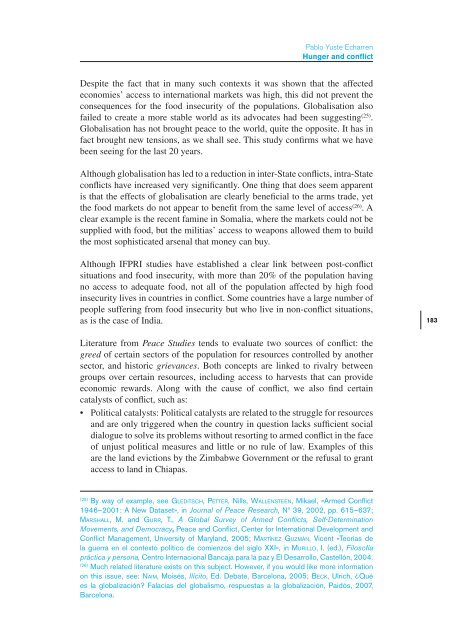Food security and global security - IEEE
Food security and global security - IEEE
Food security and global security - IEEE
- No tags were found...
Create successful ePaper yourself
Turn your PDF publications into a flip-book with our unique Google optimized e-Paper software.
Pablo Yuste EcharrenHunger <strong>and</strong> conflictDespite the fact that in many such contexts it was shown that the affectedeconomies’ access to international markets was high, this did not prevent theconsequences for the food in<strong>security</strong> of the populations. Globalisation alsofailed to create a more stable world as its advocates had been suggesting (25) .Globalisation has not brought peace to the world, quite the opposite. It has infact brought new tensions, as we shall see. This study confirms what we havebeen seeing for the last 20 years.Although <strong>global</strong>isation has led to a reduction in inter-State conflicts, intra-Stateconflicts have increased very significantly. One thing that does seem apparentis that the effects of <strong>global</strong>isation are clearly beneficial to the arms trade, yetthe food markets do not appear to benefit from the same level of access (26) . Aclear example is the recent famine in Somalia, where the markets could not besupplied with food, but the militias’ access to weapons allowed them to buildthe most sophisticated arsenal that money can buy.Although IFPRI studies have established a clear link between post-conflictsituations <strong>and</strong> food in<strong>security</strong>, with more than 20% of the population havingno access to adequate food, not all of the population affected by high foodin<strong>security</strong> lives in countries in conflict. Some countries have a large number ofpeople suffering from food in<strong>security</strong> but who live in non-conflict situations,as is the case of India.183Literature from Peace Studies tends to evaluate two sources of conflict: thegreed of certain sectors of the population for resources controlled by anothersector, <strong>and</strong> historic grievances. Both concepts are linked to rivalry betweengroups over certain resources, including access to harvests that can provideeconomic rewards. Along with the cause of conflict, we also find certaincatalysts of conflict, such as:• Political catalysts: Political catalysts are related to the struggle for resources<strong>and</strong> are only triggered when the country in question lacks sufficient socialdialogue to solve its problems without resorting to armed conflict in the faceof unjust political measures <strong>and</strong> little or no rule of law. Examples of thisare the l<strong>and</strong> evictions by the Zimbabwe Government or the refusal to grantaccess to l<strong>and</strong> in Chiapas.(25)By way of example, see Gleditsch, Petter, Nills, Wallensteen, Mikael, «Armed Conflict1946–2001: A New Dataset», in Journal of Peace Research, Nº 39, 2002, pp. 615–637;Marshall, M. <strong>and</strong> Gurr, T., A Global Survey of Armed Conflicts, Self-DeterminationMovements, <strong>and</strong> Democracy, Peace <strong>and</strong> Conflict, Center for International Development <strong>and</strong>Conflict Management, University of Maryl<strong>and</strong>, 2005; Martínez Guzmán, Vicent «Teorías dela guerra en el contexto político de comienzos del siglo XXI», in Murillo, I. (ed.), Filosofíapráctica y persona, Centro Internacional Bancaja para la paz y El Desarrollo, Castellón, 2004.(26)Much related literature exists on this subject. However, if you would like more informationon this issue, see: Naim, Moisés, Ilícito, Ed. Debate, Barcelona, 2005; Beck, Ulrich, ¿Quées la <strong>global</strong>ización? Falacias del <strong>global</strong>ismo, respuestas a la <strong>global</strong>ización, Paidós, 2007,Barcelona.
















